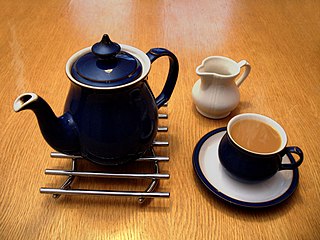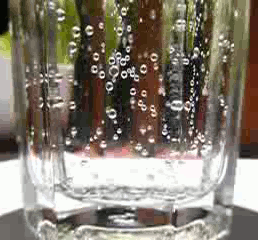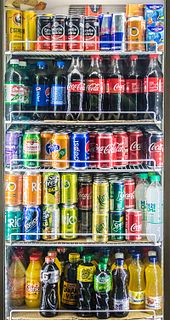 W
WA drink is a liquid intended for human consumption. In addition to their basic function of satisfying thirst, drinks play important roles in human culture. Common types of drinks include plain drinking water, milk, coffee, tea, hot chocolate, juice and soft drinks. In addition, alcoholic drinks such as wine, beer, and liquor, which contain the drug ethanol, have been part of human culture for more than 8,000 years.
 W
WDrinks are liquids that can be consumed. In addition to basic needs, drinks form part of the culture of human society. In a commercial setting, drinks, other than water, may be termed beverages.
 W
WCarbonated water is water containing dissolved carbon dioxide gas, either artificially injected under pressure or occurring due to natural geological processes. Carbonation causes small bubbles to form, giving the water an effervescent quality. Common forms include sparkling natural mineral water, club soda, and commercially-produced sparkling water.
 W
WCeanothus americanus is a species of Ceanothus shrub native to North America. Common names include New Jersey tea, Jersey tea ceanothus, variations of red root, mountain sweet, and wild snowball. New Jersey tea was a name coined during the American Revolution, because its leaves were used as a substitute for imported tea.
 W
WChilate is a drink prepared with cocoa, rice, cinnamon and sugar. It is originally from Ayutla de los Libres, Guerrero, México. Chilate is served cold and usually accompanied with buñuelos. In Oaxaca, Mexico, chilate is a typical dish the region that is a type of broth made with chicken.
 W
WAn energy drink is a type of drink containing stimulant compounds, usually caffeine, which is marketed as providing mental and physical stimulation. They may or may not be carbonated and may also contain sugar, other sweeteners, herbal extracts, taurine, and amino acids. They are a subset of the larger group of energy products, which includes bars and gels, and distinct from sports drinks, which are advertised to enhance sports performance. There are many brands and varieties in this drink category.
 W
WA flaming drink is a cocktail or other mixed drink that contains flammable, high-proof alcohol, which is ignited prior to consumption. The alcohol may be an integral part of the drink, or it may be floated as a thin layer across the top of the drink. The flames are mostly for dramatic flair. However, in combination with certain ingredients, the flavor of the drink is altered. Some flavors are enhanced, and the process may impart a toasted flavor to some drinks.
 W
WHouse wine generally refers to an inexpensive drinking wine served in restaurants. Restaurant menus often omit detailed descriptions of a house wine's country of origin, winery or grape varietal, listing it simply as "house red" or "house white", depending on the wine's style. Some restaurants offer more specific categories of house wines, such as a "house chardonnay", or a "house merlot".
 W
WKava or kava kava is a crop of the Pacific Islands. The name kava is from Tongan and Marquesan, meaning 'bitter'; other names for kava include ʻawa (Hawaiʻi), ʻava (Samoa), yaqona or yagona (Fiji), sakau (Pohnpei), seka (Kosrae), and malok or malogu. Kava is consumed for its sedating effects throughout the Pacific Ocean cultures of Polynesia, including Hawaii, Vanuatu, Melanesia, and some parts of Micronesia, such as Palau. To a lesser extent, it is consumed in nations where it is exported as a herbal medicine.
 W
WLiquor or spirit is an alcoholic drink produced by distillation of grains, fruits, or vegetables that have already gone through alcoholic fermentation. The distillation process concentrates the liquid to increase its alcohol by volume. As liquors contain significantly more alcohol (ethanol) than other alcoholic drinks, they are considered "harder" – in North America, the term hard liquor is sometimes used to distinguish distilled alcoholic drinks from non-distilled ones, whereas the term spirits is used in the UK. Examples of liquors include brandy, vodka, absinthe, gin, rum, tequila, and whisky.
 W
WA national drink is a distinct beverage that is strongly associated with a particular country, and can be part of their national identity and self-image. National drinks fall into two categories: alcoholic and nonalcoholic. An alcoholic national drink is sometimes a liquor drunk straight/neat, but is most often a mixed drink or beer or wine. A beverage can be considered a national drink for a variety of reasons:It is a common drink, made from a selection of locally available foodstuffs that can be prepared in a distinctive way, such as mango lassi that uses dahi, a traditional yogurt or fermented milk product, originating from the Indian subcontinent, usually prepared from cow's milk, and sometimes buffalo milk, or goat milk. It contains a particular 'exotic' ingredient that is produced locally. It is served as a festive culinary tradition that forms part of a cultural heritage—for example eggnog in the US during the holiday period. It has been promoted as a national dish by the country itself.
 W
WMint lemonade is lemonade flavored with mint. It may be made with whole mint leaves, mint-flavored syrup, or pureed mint leaves, and may be served over ice cubes or blended with ice into a slush or smoothie. It is sometimes called a virgin mojito.
 W
WA Signature drink is any unique or original drink that expresses the nature of the person or establishment creating it.
 W
WA slush, commonly known as a slushie, slushee, or slushy, is a type of beverage made of flavored ice, similar to granitas. In 7-Eleven stores, slushies are called a Slurpee.
 W
WA sweetened beverage is any beverage with added sugar. It has been described as "liquid candy". Consumption of sweetened beverages has been linked to weight gain, obesity, and associated health risks. According to the CDC, consumption of sweetened beverages is also associated with unhealthy behaviors like smoking, not getting enough sleep and exercise, and eating fast food often and not enough fruits regularly.